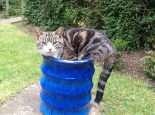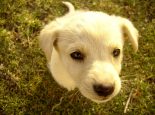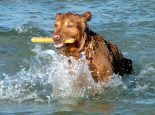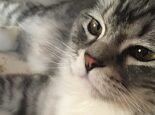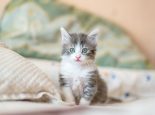Pet answers: Christmas pets
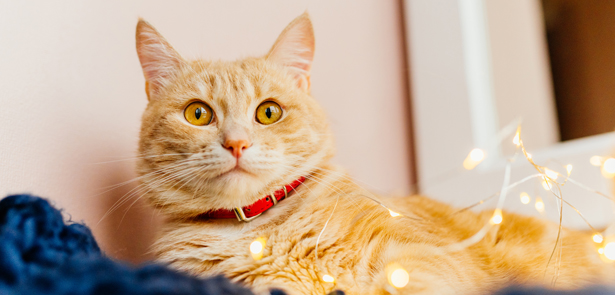
Don’t settle for pet theories, get pet answers! Veterinary surgeon Holly Norman answers your animal health questions
I’m going away over the holiday period and I’m worried about putting my dog in kennels. She’s never been in one before and I don’t want her to get stressed. Can you recommend anything?
I know how you feel! Both of my dogs regularly spend time in kennels and although I know that they will be spoilt rotten, I still worry about them! A good kennels or cattery will immediately understand this and work with you to help your dog or cat feel at home. I always recommend visiting the kennels beforehand to walk around and see what the accommodation is like. Feel free to ask questions about how they feed and exercise the animals in their care and whether they have different approaches to elderly or nervous animals. Once you have selected your kennel or cattery of choice, it can be worthwhile booking your pet in for a trial stay of just one night. A good kennels will make this a really positive experience for your pet so that when it comes to staying there for longer, your dog or cat is already viewing it as a fun place to stay! Lastly, take some familiar items with you to make them feel at home; I always include a favourite blanket and treats as well as some toys.
I’m really looking forward to Christmas this year with my new puppy but I know that some foods are poisonous to dogs?
Christmas is such an exciting time for both us and our pets and we’re allowed to indulge ourselves! However, there are some foods that are dangerous to both cats and dogs and you need to keep these ones out of reach. Chocolate contains a chemical called theobromine that can cause vomiting, diarrhoea and even seizures. Dark chocolate and cocoa are the most poisonous and very small amounts of these can make your pets seriously ill. The caffeine in tea and coffee is great for getting us up in the mornings, but dogs are very sensitive to it. A quick slurp may not cause any issues but eating coffee beans or teabags can cause real problems. Artificial sweeteners can also cause a life-threatening drop in blood glucose levels.
Blue cheeses, especially stilton and roquefort, contain a chemical which dogs are particularly sensitive to and can cause intestinal signs and seizures. We generally recommend avoiding feeding large amounts of cheese or milk to dogs, anyway, as they don’t tolerate the lactose very well and can get tummy upsets. As well as cheese, there’s always lots of alcohol around at Christmas time. Dogs don’t tolerate alcohol well at all and it can cause severe signs such as vomiting, diarrhoea and even death. Onions, garlic and chives can cause damage to the intestines and severe anaemia with the signs only showing a few days after your dog has eaten them.
Raisins are particularly poisonous to dogs so make sure they don’t get any Christmas pudding or mince pies! Dogs and cats process certain foods and chemicals very differently to humans and so this means that something that is very safe for us, can potentially be fatal for our pets. If you have any questions or are concerned that your pet has eaten something they shouldn’t have, always contact your vet. Alternatively, you can contact the Animal Poison Line on 01202 509000 (charges apply) which is a dedicated phone service that helps owners that are worried if their pet has eaten something poisonous. If you would like to give your dogs a treat this Christmas, I’d suggest a slice or two of turkey breast or even some raw vegetables such as carrot or broccoli. Better yet, treat them to a doggy selection box that will be full of yummy chews and treats to keep them occupied on Christmas Day!
This is my first Christmas with my new kittens and I’m worried about them knocking all the Christmas decorations off or climbing the tree!
It doesn’t matter how carefully we arrange decorations or where we put them, some cats always seem to view them as their own personal playground! Unfortunately, the temptation of all those sparkly, jingly decorations is often too much for cats and so I’d recommend making sure they don’t have access to them when you are not able to supervise them. Cats can swallow small decorations or ribbons and tinsel which block the intestines and need surgery. They can also knock decorations over or cause them to break which could become a hazard and we even see some young cats that have had electric shocks from chewing wires of Christmas lights. I
’d suggest providing lots of other toys in a separate area to encourage safe play and wherever possible, try and limit the decorations that they can reach. Maybe go all out with the decorations in the living room and only allow the kittens to access this area if you’re at home and can supervise? And just a reminder that some Christmas plants, such as poinsettia, mistletoe and lilies are very poisonous to cats.
Do you have a pet or animal health question? Send it to us at: Holly will endeavour to answer all questions, whether published or not!
Dr Holly Norman BSc (Hons) BVetMed MRCVS, veterinary surgeon and practice partner at:
 Peterborough Vets4Pets
Peterborough Vets4Pets
231-233 St Paul’s Road
Peterborough
PE1 3RL
Tel: 01733 890777
Bretton Vets4Pets
Inside Pets at Home
Unit 2 The Bretton Centre
Peterborough, PE3 8DN
Tel: 01733 261094
www.freepik.com/photos/christmas
Christmas photo created by freepic.diller









